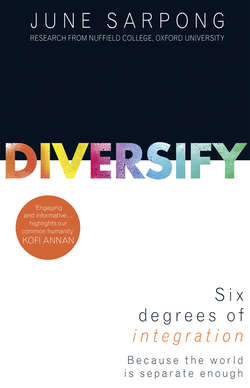Читать книгу Diversify: A fierce, accessible, empowering guide to why a more open society means a more successful one - June Sarpong, June Sarpong - Страница 14
ОглавлениеThe Other Way
‘If you treat an individual as he is, he will remain how he is. But if you treat him as if he were what he ought to be and could be, he will become what he ought to be and could be.’
Johann Wolfgang von Goethe
If you are one of the ‘other’ men reading this, then I thank you for persevering in the face of life’s obstacles. I hope I have given an accurate account of your plight – generalizations notwithstanding. To the rest of us who regard these ‘other’ men as ‘them’ rather than ‘us’, I would say this: there is another way.
To create a new normal, each of us must change the way we see, treat and include the ‘other’ man – to break down the stereotypes that we ourselves have created based on nothing more than outward appearances. Equally, we must turn our attention to class: in a report entitled ‘Elitist Britain’ by the UK Government’s Mobility and Child Poverty Commission, it was concluded that elitism was so ingrained in British society ‘that it could be called “social engineering”’. Too often, this is at the expense of the ‘other’ man.
And across all three of these ‘other’ groups, we must reassess our understanding of ‘masculinity’ in the round. As we’ve seen, these men inhabit their respective subcultures where their own rules and norms apply, which will often conflict with mainstream values – particularly the acceptance of violence as being part of a man’s DNA. If we can help change the script within these subcultures about what a man ‘ought’ to be, then we can surely help to stem the flow of violence that often spills out into the world as a result of their frustrations.
On a wider scale, the issues society has with its ‘other’ men are ingrained and complex, and we require effective leadership to fully address them. We need politicians and policy makers who are not just driven by self-interest, but are willing to make tough decisions and take the long-term approach needed to fix these problems. Our ‘other’ men trigger three of the toughest issues that society is yet to reconcile: race, religion, and class. However, there are countless examples of regeneration and integration programmes that have been proven to work (go to www.Diversify.org to see the remarkable case study of Braddock, Pennsylvania, where Mayor John Fetterman is spearheading a fantastic regeneration drive of this ailing steel town). What they show is that it’s only by turning our attention to marginalized groups such as the ‘other’ man that we can reach our full potential as a society, and that when we get it right, we all benefit.
THE OTHER MAN:
The Numbers
Disparities in earnings and unemployment in the UK and the USA *
Disparities in rates of incarceration *
Facts and figures
• 15%: the proportion of Muslim prisoners in 2015 up from 8% in 2002.
• The Young Report of 2014 found that ‘Most of the prisoners we met with all said that they experienced differential treatment as a result of their race, ethnicity or faith. Black prisoners felt that they were stereotyped as drug dealers and Muslim prisoners as terrorists’.
• 50%: according to Unlocking America, if African American and Hispanics were incarcerated at the same rates as whites, today’s prison and jail populations would decline by a half.
• 12%: the percentage of drug users in the USA who are African American, but 38% of arrests for drug offences and 59% of those in state prison for a drug offence are African American.
• Twice as likely: the Pew Research Center finds that, in the USA, blacks are twice as likely to be in poverty as whites.
• 50%: the percentage of Muslim households in poverty in the UK, according to the Joseph Rowntree Foundation, compared to the national average of 18%
